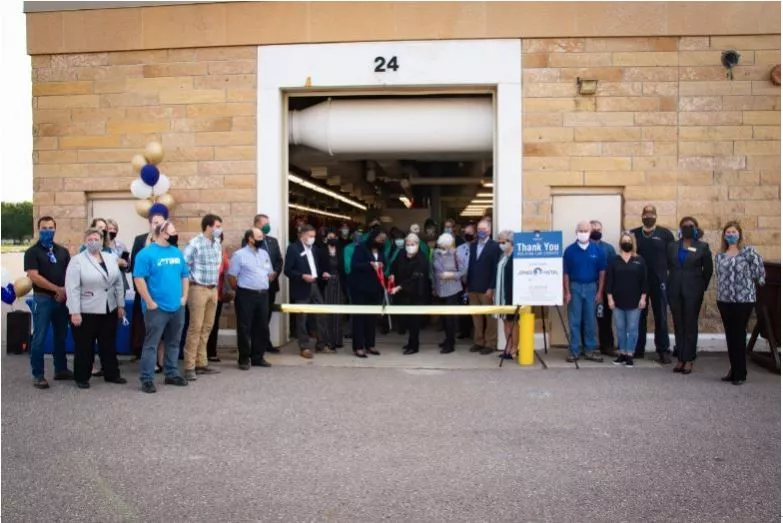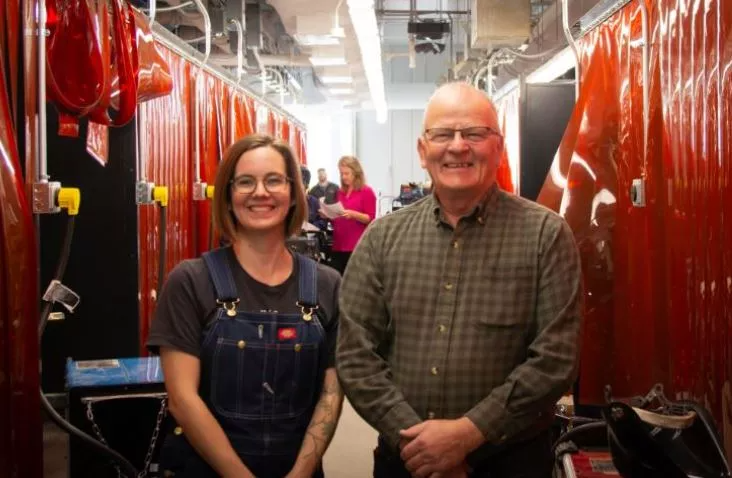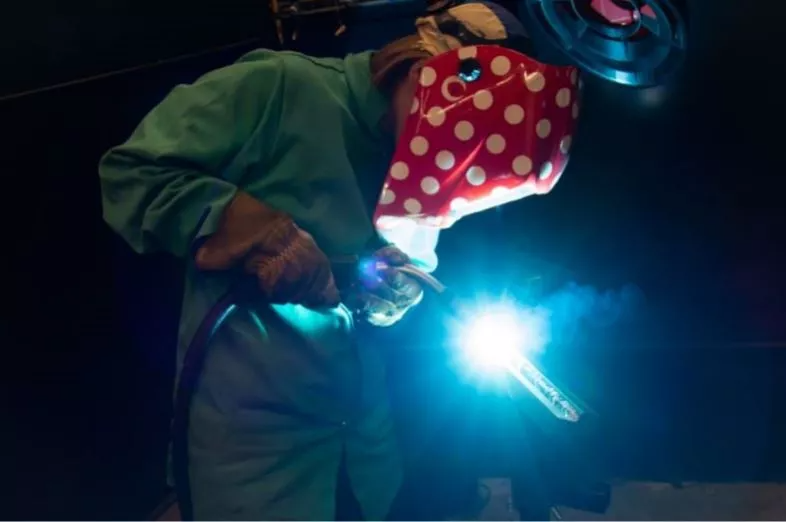A student demonstrates her MIG welding technique at the grand opening of the new welding lab at South Central College, North Mankato, Minn., in September. Photos courtesy of South Central College
Financial donations for South Central College welding lab aim to develop local manufacturing talent
The Fabricator (January 2, 2021)—When Sarah Richards went to work for the family metal fabricating company, Jones Metal Inc., Mankato, Minn, in the latter part of the first decade of the 2000s, one of the first things she tackled was recruitment and employee retention. Early on she saw the difficulty in trying to entice young people into considering a career in manufacturing.
Today Richards and other nearby manufacturers who joined the cause see the fruition of their commitment to promoting manufacturing. With the help of state funding and additional financial support from the Jones family’s charitable foundation and those local metal fabricating companies, the North Mankato campus of South Central College now has a state-of-the-art welding lab and a waiting list of students to get into it.
“I feel like the more people with good skills and who have an interest in manufacturing that we can put into the local manufacturing pool, the better it is for everybody,” said Richards, who is now president and CEO of Jones Metal. “So we try and work hard in this region to support programs that do exactly that.”
Starting From Scratch
Manufacturing had sort of slipped off the radar for most of the Mankato area by 2005, even with the presence of several metal fabricating facilities in the area. The local middle schools and high schools weren’t emphasizing vocational training, and even South Central College had dropped its welding program.
In the latter part of that decade, Richards and some of her fellow manufacturers, some of which could be considered competitors, joined forces, meeting with local educational officials to try to get them to recognize what vocational training meant for local manufacturing companies and what it could mean for those students who had no interest in pursuing a four-year degree at a university.
In addition to meetings, local manufacturers hosted visits to their facilities and joined advisory councils to provide real-world perspectives for educational professionals whose primary focus was educating their students. The Great Recession caused some of the manufacturers to be less involved in the educational efforts, but a core group still pushed forward.
“We got some momentum going as far as getting students in high school educated about what careers were available in metal fabricating and manufacturing,” said Matt Doherty, president, Industrial Fabrication Services, Lake Crystal, Minn “The Mankato school district would have a career day, and they would be able to arrange to have welding simulation trailers come in, and the students were able to try that. It was a real grassroots kind of movement.”
Their activism played a large part in South Central College recognizing what was happening at the secondary school level and eventually reestablishing its welding programs at both its Faribault, Minn., and North Mankato, Minn., campuses.
“We have to keep these programs going, and we must provide them with the best technology,” Richards said.
That was a bit of an issue at the college’s North Mankato campus. The welding lab was old and cramped. It had only 12 welding booths and no dedicated classroom for lessons and discussions with the students between actual welding practice.
In 2017 the Minnesota legislature approved a $9.6 million bonding appropriation for renovations on the North Mankato campus. To get the latest technology into the welding lab, however, South Central College needed additional funding. That’s where the local manufacturers and a labor union stepped in.

Annette Parker (left), president, South Central College, and Sarah Richards (right), president and CEO, Jones Metal Inc., each hold the scissors as they cut the ribbon officially marking the opening of the school’s remodeled welding lab.
A $100,000 contribution from Jones Metal was made through the Page Jones Richards Family Fund, the charitable foundation set up by the founders of the metal fabricating company, Cecil and Mildred Jones. Richards is the Joneses’ granddaughter.
G&S Manufacturing, Courtland, Minn.; Truck Bodies & Equipment International (TBEI), Lake Crystal, Minn.; Jarraff Industries Inc., St. Peter, Minn.; Industrial Fabrication Services; and the Joint Apprenticeship and Training Committees of Plumbers Local 34 and Pipefitters Local 455 donated $20,000 each.
Even though TBEI is owned by the Federal Signal company, which is headquartered in Oak Brook, Ill., its officials in Lake Crystal didn’t need to do a lot of convincing to sway its corporate parents to support the new welding lab. Of TBEI’s 200 employees, about 65 of them are welders, with at least a dozen of them graduates of South Central College.
“Our leadership understands how critical it is that we have this type of program in the area and how vital it is for our business, now and in the long run,” said Brett Hart, the Lake Crystal facility’s plant manager.
G&S Manufacturing, which employs about 28 people, easily could have felt overshadowed by its larger manufacturing brethren, but it also knows how important having a source of new manufacturing talent is.
“Collaboration over competition is always good,” said Jessica Kloeckl, a human resources and accounting specialist with G&S Manufacturing, another area metal fabricator. “The more we work together and bring awareness to the welding and fabrication fields, the better it is for all of us.
“Obviously, at times we are competing for employees, but without us raising the awareness of the welding trade, we may not have employees at all to fight over,” she added.
New Beginnings
When students returned to school for the fall semester at South Central College, they noticed some big changes. About 34,000 sq. ft. of the building had been remodeled. This included not just the welding lab, but also lab space for the agriculture and health science programs.
The welding area now has 20 welding booths with the latest ventilation technology that keeps the indoor air quality in much better shape than when even just a handful of students were practicing their skills simultaneously in the older 12-booth setup. The lab also has a classroom where the students can gather to go over things like welding symbols and good safety practices.
Richards said that four of the booths have video capabilities, which has turned out to be a great help during the COVID-19 pandemic. Because instructors need to keep their distance, which can be pretty hard in the confines of a welding training booth, they can lean on the video-enabled booths to offer that “looking over the shoulder guidance.” An overhead camera captures the student’s welding, and the instructor is able to offer real-time coaching to the student through an audio connection. The student doesn’t have to wait until the weld is done and share the coupon with the instructor.

Student Angie Anderson, who earned her welding certificate in December 2019, and her instructor Dean Odette pose in the welding lab in 2019.
The waiting list for the semester-long welding class is evidence of its popularity with students. Kellie McElroy Hooper, dean of the college’s career and technical education department, said the new classroom environment helps to build interest in the program as well.
“I don’t think we would be able to attract students with this type of enthusiasm for the subject without this new environment,” she said. “Anytime you give people a nice, clean environment that’s also very professional, you are going to get better results in the end.”
Right now South Central College offers a welding certificate that covers blueprint reading, welding safety, shielded metal arc welding, gas metal arc welding, gas tungsten arc welding, metal cutting, and brazing. Students attend class all day, every school day for an entire semester. If they pass the course, they get their certificate as proof of completion.
McElroy Hooper said that some students who are unable to register for the welding certificate class opt to sign up for the Machining Technology courses, which cover machining computations; CNC milling; CNC turning; job planning, benchwork, and layout; and measurement, materials, and safety. When the semester-long course has been completed, the students then have priority to sign up for the welding course. When both courses are completed for a total of 33 credits, the student earns a diploma of Welding and Machining Technology.
“We mostly do MIG welding here, but we do like to see employees who have the overall skills that they teach at South Central College,” said Brandon Mohr, safety/human resources manager, TBEI. “They touch on a lot of different things, from blueprint reading to identifying and repairing weld defects. They do a good job of teaching them to produce quality welds, whether it’s MIG, TIG, or some sort of brazing.”
The fabricators interviewed for this story were complimentary of the South Central College program on also developing the students’ soft skills. Many of the welding students that have entered the local workforce are punctual, understand the purpose of keeping a clean and organized workspace, and work well in teams.
“Obviously, being in manufacturing, it’s important that our employees are here on time so that we can fabricate the products that keep our customers happy. Also, a lot of our employees work together in teams, so they have to have those soft skills,” said TBEI’s Hart. “I think South Central does a pretty good job of teaching them what it takes to be successful in a manufacturing environment.”
Based on interest in the welding program, McElroy-Hooper said that the college is looking to add an evening welding class for those nontraditional students that might have to work during the day. Even more demand for the class is likely once people become more comfortable being in a classroom setting with others in the post-pandemic world.
“If industry supports this program and word-of-mouth builds through the other students, I think the sky is the limit for us,” McElroy Hooper said.
Richards of Jones Metal said that the South Central College administration, faculty, and students shouldn’t worry about industry support waning. After working so hard to show support for vocational education at area schools and colleges, local manufacturers aren’t about to let the program wither away again.
“We’re not going to let these programs die again. We’re not going away,” Richards said. “We’re going to continue to do our best to support them.”

